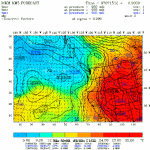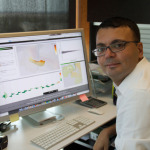In this video, Al Roker from the Today Show looks at how Cray XC30 supercomputers give ECMWF more accurate forecasts than we get here in America. ECMWF uses advanced computer modeling techniques to analyze observations and predict future weather. Their assimilation system uses 40 million observations a day from more than 50 different instruments on satellites, and from many ground-based and airborne measurement systems.
How HPC is Helping Solve Climate and Weather Forecasting Challenges
Data accumulation is just one of the challenges facing today weather and climatology researchers and scientists. To understand and predict Earth’s weather and climate, they rely on increasingly complex computer models and simulations based on a constantly growing body of data from around the globe. “It turns out that in today’s HPC technology, the moving of data in and out of the processing units is more demanding in time than the computations performed. To be effective, systems working with weather forecasting and climate modeling require high memory bandwidth and fast interconnect across the system, as well as a robust parallel file system.”
WRF Microphysics Optimization
“Microphysics provides atmospheric heat and moisture tendencies. This module has been optimized to take advantage of the Intel Xeon Phi coprocessor. However, some manual optimization can lead to even greater performance gains. By using manual optimizations, the overall speedup on a host CPU (Intel Xeon E5-2670) was 2.8 X, while the performance of running on the Intel Xeon Phi coprocessor was 3.5 X.”
Weather Prediction with Intel Xeon Phi
“Modern Numerical Weather prediction (NWP) can now use many thousands of cores in a single run of the application. By using modern CPUs such as the Intel Xeon processors and the Intel Xeon Phi coprocessors, tremendous performance and efficiency can be obtained. It is important to remember that many of the applications are written in Fortran and many of the contributors are domain experts, not parallel programming gurus.”
KAUST Scientists Working to Predict Extreme Weather
KAUST University in Saudi Arabia reports that researchers are using simulation to better understand severe weather events that have caused catastrophic flooding and loss of life in the region.
UK Met to Deploy ENDGame Model to Improve Forecasts
The UK Met Office is using a new supercomputer-powered model called ENDGame to forecast England’s notoriously unpredictable weather.







